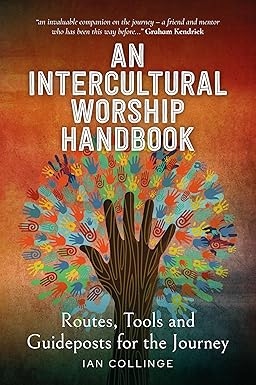Intercultural worship is desirable - and possible
In the UK and across the world, a vision for intercultural worship is developing, writes Ian Collinge, who has just authored An Intercultural Worship Handbook for congregations seeking to find out more
 Something is happening in churches these days. Congregations are learning the songs, stories, prayer styles, sounds, beats, moves and worship gifts of believers from all sorts of cultures. It’s countercultural and beautiful—a “taste of heaven”—reminding us of the vision in Revelation 7:9 of people from every tribe, tongue and nation worshipping God together.
Something is happening in churches these days. Congregations are learning the songs, stories, prayer styles, sounds, beats, moves and worship gifts of believers from all sorts of cultures. It’s countercultural and beautiful—a “taste of heaven”—reminding us of the vision in Revelation 7:9 of people from every tribe, tongue and nation worshipping God together.
Worship in these churches is no longer monocultural and monolingual. It’s becoming multicoloured and diverse. As they worship alongside one another, they are each learning to appreciate God’s grace in other people’s backgrounds. No longer do they consider only their own worship tastes.
Instead, they “look to the interests of others” (Philippians 2:4) and are profoundly enriched by the love of Christ shown in diverse cultures. In the UK and across the world, a vision for intercultural worship is developing. There are many motivations but, for whatever reason, intercultural worship is a demonstration of the wall-breaking and unifying power of the Gospel of Jesus (Ephesians 2:14–18).
Intercultural worship is desirable
Why do these churches desire intercultural worship? Most importantly, it is God’s idea. The whole Bible reveals God as creative, delighting in abundant, colourful—and sometimes confusing—diversity. We also see that God desires all nations to glorify him (Psalm 86:9) and for these nations to worship him together (Isaiah 19:23–24).
This is often at odds with our church experience. Yet, God’s vision for his people to worship in unity and diversity, with each group bringing the best of their cultures (Revelation 21:24, 26) is one that spurs many. The fact is, the Church today, especially in our multicultural towns and cities, has an opportunity to embody that vision this side of Jesus’ return! It is a way for the Bride of Christ to prepare herself for the Bridegoom! These are just some of the reasons I wrote An Intercultural Worship Handbook: Routes, Tools and Guideposts for the Journey.[1]
First, though, what is the difference between “multicultural” and “intercultural worship"? Quite simply, in multicultural worship, the church’s leading cultural group usually still decides what happens, welcoming certain levels of inclusion and diversity.
By contrast, in intercultural worship, people from diverse cultures dream, plan and host worship together! As cultural and spiritual equals, they are responding together with all that they are to all that God has revealed to us of his glory.[2]
As Paul says to the ethnically mixed Corinthian church, “When you come together, each of you has a hymn, or a word of instruction, a revelation, a tongue or an interpretation. Everything must be done so that the church may be built up” (1 Corinthians 14:26). Each person and group gets the opportunity for their worship expressions to be voiced, playing their part in building others up.
Intercultural worship is possible
Intercultural worship is not only desirable; it is possible—in our day! While the journey into intercultural worship usually includes roadblocks, none of these should put us off. They should prompt us to press on to seek God’s way forward.
As an ethnodoxologist, with experience as a musician, pastor, ethnomusicologist and cross-cultural missionary, I have seen churches in England move from monocultural worship into multicultural worship, gradually metamorphosing into intercultural community and worship. Some readily pursue this goal, quite a few are trying things out, while others are considering it. Very few would say they have “arrived”. Where is your church on this spectrum?
An Intercultural Worship Handbook, then, gives biblical and practical pointers to churches at different points on the spectrum. It outlines ways to see vision become reality, providing tools to chart the best route and resources that many styles of church can draw on. These tools will help you listen carefully to one another’s songs, life stories and desires, and to experiment together.
The book starts with clarifying your biblical vision, moving through various stages (listening, understanding, appreciating, co-creating, improving and integrating), on the way to becoming a “culture of many cultures”, in the words of Harvey Kwiyani.[3]
The worship of such congregations can then be “owned” by all groups in the church. They continue to learn from the global and historic Church, but they are discovering the unique expression of their church’s Spirit-led offering to the God of glory. Such worship that puts Christ and his Word at the centre but also honours one another’s expressions will begin to look, sound and feel like worship on earth as in heaven.
Ian Collinge is an ethnodoxologist with WEC International and Associate Tutor at All Nations Christian College, with experience as a musician, pastor, ethnomusicologist and cross-cultural missionary. He is a Spurgeon's College graduate
An Intercultural Worship Handbook: Routes, Tools and Guideposts for the Journey (2025) by Ian Collinge is published by Canterbury Press Norwich
-
Ian Collinge, An Intercultural Worship Handbook: Routes, Tools and Guideposts for the Journey (Norwich: Canterbury Press, 2025).
-
Echoing Ron Man’s excellent definition of worship in Let Us Draw Near, Biblical Foundations of Worship (Eugene, Oregon: Wipf and Stock, 2023), 59.
-
Harvey Kwiyani, Multicultural Kingdom: Ethnic Diversity, Mission and the Church (Norwich: SCM Press, 2020), 113.
Do you have a view? Share your thoughts via our
letters' page.
Baptist Times, 07/07/2025